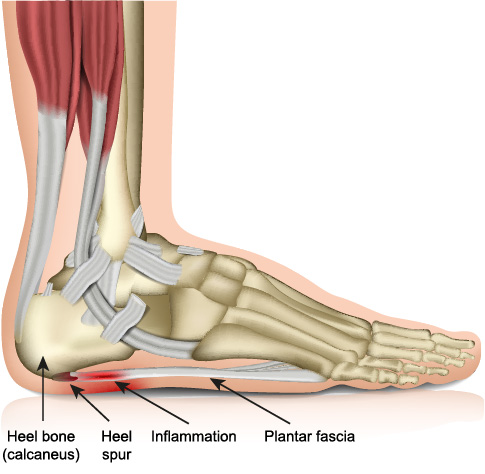Plantar Fasciitis is the leading cause of heel pain in adults. While it typically develops gradually, it can also begin suddenly, causing discomfort and heel pain. Plantar fasciitis can hinder walking and lead to additional problems in the calf muscles, ankles, and foot.

The Plantar Fascia is a fibrous band (ligament) that runs from your heel bone to the webbing at your toes. It acts as an elastic band to support the foot arch and help facilitate proper foot motion. Plantar Fasciitis occurs when the fascia or its attachments become inflamed.
When the plantar fascia is subjected to excessive strain—due to factors such as repetitive stress, poor footwear, abnormal foot biomechanics, or obesity—it can become inflamed and irritated. This inflammation leads to pain typically felt at the bottom of the foot near the heel. Many people experience the most intense discomfort during the first steps in the morning or after prolonged periods of sitting.
Plantar fasciitis can lead to further complications, such as heel spurs or chronic pain, if left untreated. Early recognition of the signs and symptoms is essential for effective management and recovery. If left untreated, the plantar fascia gradually deteriorates and weakens, potentially leading to the formation of scar tissue. This degradation is referred to as ‘plantar fasciopathy’ or ‘fasciosis’ and usually indicates the chronic stage of plantar fasciitis.
Symptoms of plantar fasciitis
Foot pain from plantar fasciitis can occur in various areas, but it is most common to feel heel pain, especially when walking after prolonged inactivity. Symptoms commonly include:
Several symptoms of Plantar Fasciitis overlap with those of Posterior Tibial Tendon Dysfunction, with both causing pain throughout the arch of the foot and ankle. It’s recommended to consult a podiatrist to receive an accurate diagnosis and rule out any other conditions.
Pain Triggers
Exercise Impact:
Plantar fasciitis is primarily caused by a combination of factors that place undue stress on the plantar fascia, the thick band of tissue running along the bottom of the foot. The main contributing factors include:
Pinpointing the exact cause of plantar fasciitis can be challenging. That’s why it’s crucial to consult a podiatrist for an accurate diagnosis. With their expertise, you can make informed lifestyle changes to support your recovery and help manage the condition effectively.
Your medical history and a physical exam of your foot and heel will determine the diagnosis of plantar fasciitis. Treating plantar fasciitis depends on the extent of the heel pain and the frequency of the pain occurring.
Your podiatrist will tailor your treatment to you; however, here are a few methods for treating Plantar Fasciitis.
Ready to give your feet the care they deserve? Book your appointment online or call us and experience our expert podiatry services at any of our six clinic locations.